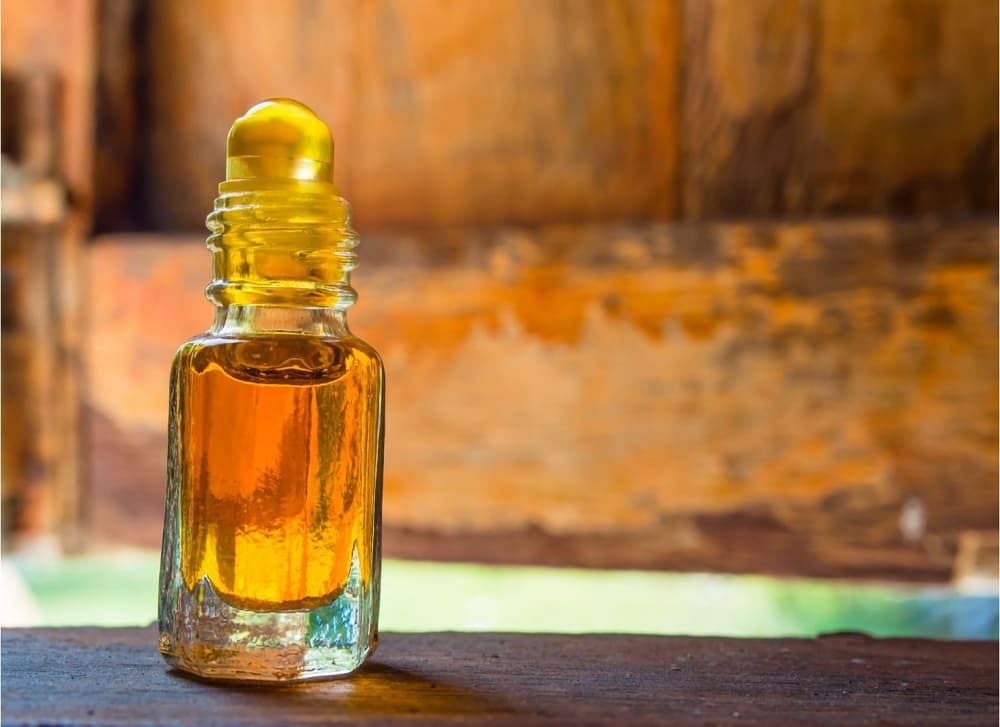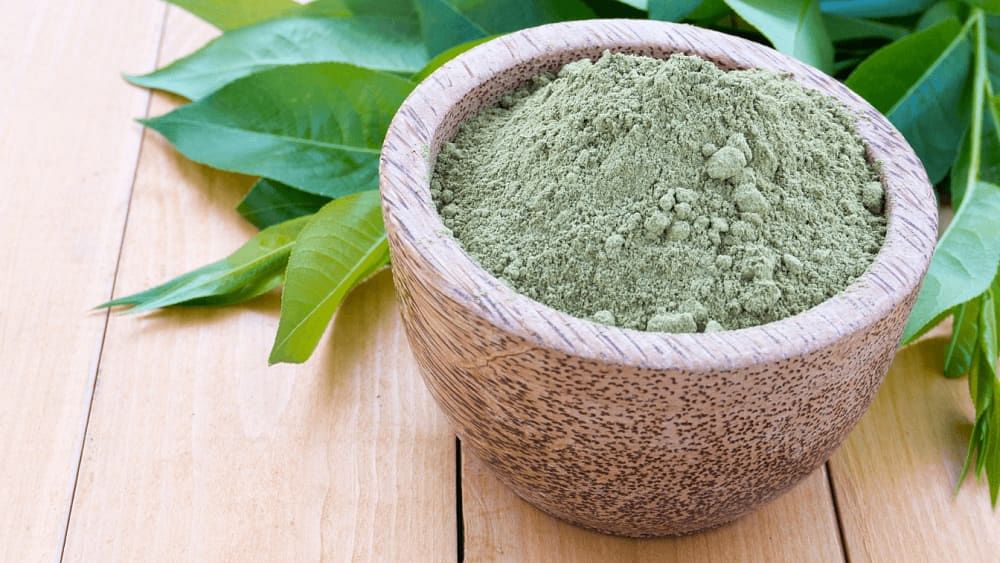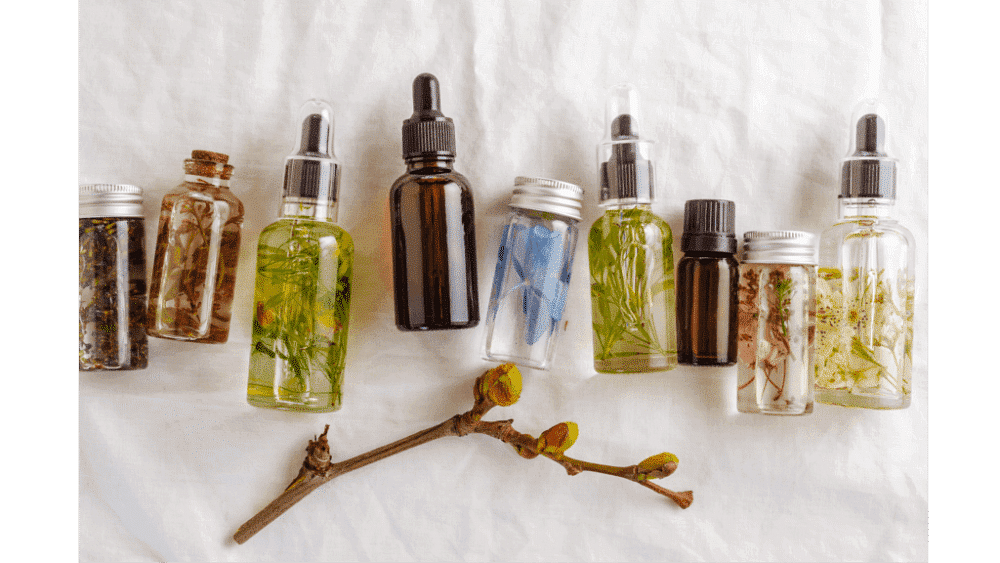Camphor oil is derived from the wood of camphor trees, scientifically known as Cinnamomum camphora, and it is aromatic. It is absorbed through the skin and has a pleasant smell.
In addition to providing pain relief and easing skin irritation, it can also offer a number of other health benefits.
This article describes the types of camphor oil, their uses, and their risks.
What Is Camphor Oil
Camphor, popularly known as Kapur, is a chemical naturally derived from the tree Cinnamomum camphora. It has a strong aroma and taste. Kapur is known for its many therapeutic benefits.
It is used for medicinal purposes in Ayurveda. Camphor balls are also used to keep pests out of the fabrics.
Do you know what camphor oil is? The oil extracted from the wood camphor tree is processed and known as camphor oil.
Nowadays, it is also synthesised from turpentine oil. There are four types of camphor oil – white, yellow, brown, and blue. Among the various types of camphor oil, only white camphor oil is useful for therapeutic purposes. The other types of camphor oil are not useful as they are toxic to human beings.
What Do the Different Colors Mean?
There are four grades and colours of camphor oil:
- White: It is the only type that is used in therapeutic applications. Despite its name, it is usually clear or slightly milky in liquid form.
- Brown and yellow: Both are toxic, containing high levels of the natural plant constituent safrole.
- Blue: Another toxic colour grade.
You should only use camphor oil that is clear or pale.
Use of Camphor Oil
Camphor has many uses because of its antibacterial and antifungal properties. It is used in various beauty and pharmaceutical products. It has a cooling effect on the skin. Most of the camphor products are available in the form of sprays, cream, ointments, or balm. It is also a major ingredient in mosquito repellents. The uses of camphor are:
- Treats skin condition
- Enhances the respiratory function
- Relieves pain, especially headaches
- Heals burn wounds
- Treats joint problems
- Treats fungal infection on skin and toenails
- Relieves cough and blockage of nose
- Relieves muscle spasms, cramps and stiffness
The camphor oil benefits in certain conditions like:
- Hair problems like balding and dandruff
- Acne
- Haemorrhoids
- Warts
- Anxiety
- Earaches
- Cold Sores
- Depression
- Flatulence
- Symptoms of heart problems
- Low libido
- Insect bites
One should only use clear or white camphor oil. In the market, camphor essential oil is also available. It is believed the strong aroma of essential oil calms your mind and removes negative energy around you.
You might be wondering how to use camphor essential oil? It can be added to electric diffusers. The fumes generated will promote decongestion, relieve stress and anxiety, and purify the surrounding air.
The camphor essential oil is used in aromatherapies. 2-3 drops of oil can be added to warm water for bathing purposes. You can also mix the camphor oil with coconut oil, sesame oil, or mustard oil and apply it directly to the hair or skin.
Camphor for Hair
Camphor oil benefits hair in many ways. It has natural moisturizing and anti-bacterial properties. It detoxifies the scalp and is useful in treating many hair problems. Camphor for hair is used in the form of tablets or oil. It
- Treats scalp irritation and itchiness
- Prevents the formation of dandruff
- Treats fungal infections like scalp ringworm
- Treats scalp bacterial infections
- Improves blood circulation on the scalp
- Promotes hair growth
- Improves the texture of hair
- Controls dryness, breakage, and split-ends
- Kills head lice
- Prevents hair fall
- Prevents balding
- Prevents premature greying of hair
Camphor for Skin
The camphor for the skin has many health benefits. It
- Relieves skin irritation
- Treats itchy skin
- Improves texture of the skin
- Treats wound
- Reduces the large pores on the skin
- Tightens the skin
- Reduces scars, minor burns and rashes
- Reduce wrinkles and signs of ageing
- Increases the elasticity of the skin
- Benefits acne-prone skin by reducing the buildup of dirt, oil and bacteria
Types of Camphor
Four distinct fractions of camphor oil exist white, brown, yellow, and blue camphor. White camphor is the form that is used for aromatherapy and OTC products. Yellow and brown fractions often contain the carcinogen safrole and are generally unavailable.
Camphor Oil Side Effects
The camphor oil side effects are
- Few people are sensitive to camphor. It can cause allergic reactions like redness and skin irritation in sensitive people.
- When inhaled in large amounts, it can cause:
- Nausea
- Vomiting
- Restlessness
- Seizures
- Increase blood pressure
- Burning sensation in mouth and throat
- Camphor or camphor products should not be taken orally.
- Yellow, blue, and brown camphor oil is toxic and not safe for oral consumption. They have a chemical that can cause cancers in human beings.
- Do not use undiluted products of camphor.
- Avoid eyes, ears, nostrils, or nose contact with camphor products
- People who have the following conditions should refrain from using camphor:
- Epilepsy
- Neurological problems
- Asthma
- Other respiratory problems
- Liver problems
- Open wounds
- Broken or injured skin
- Pregnant or breastfeeding
- Children under the age of 2
People undergoing major surgery, taking prescribed medicines, stroke, or major health issues should consult their doctor before using any camphor products.
To avoid camphor oil side effects, do a patch test on the skin. Take a small amount of camphor oil mixed with coconut or mustard oil for the test.
Apply it to a small area of the skin. Wait for a day to check for any allergic reactions before applying camphor oil. Consult a healthcare practitioner in case of allergic reactions.
How to Make Camphor Oil
For this, all you need is camphor tablets and coconut oil.
- Crush two camphor tablets to make camphor powder.
- Add half a cup of extra virgin coconut oil to the crushed tablets
- Stir in camphor powder and coconut oil until it dissolves.
- Apply as needed.
Summing Up on Camphor Oil
Camphor oil can be used to treat a number of ailments, including some skin conditions and pain.
Prior to using a product containing the oil, it is best to consult a doctor, especially if someone is taking medication or pregnant.
If you have any concerns about possible interactions, it is best to consult a doctor before using any essential oil.
In addition, testing topical camphor products on small areas of skin first can prevent widespread adverse reactions.










